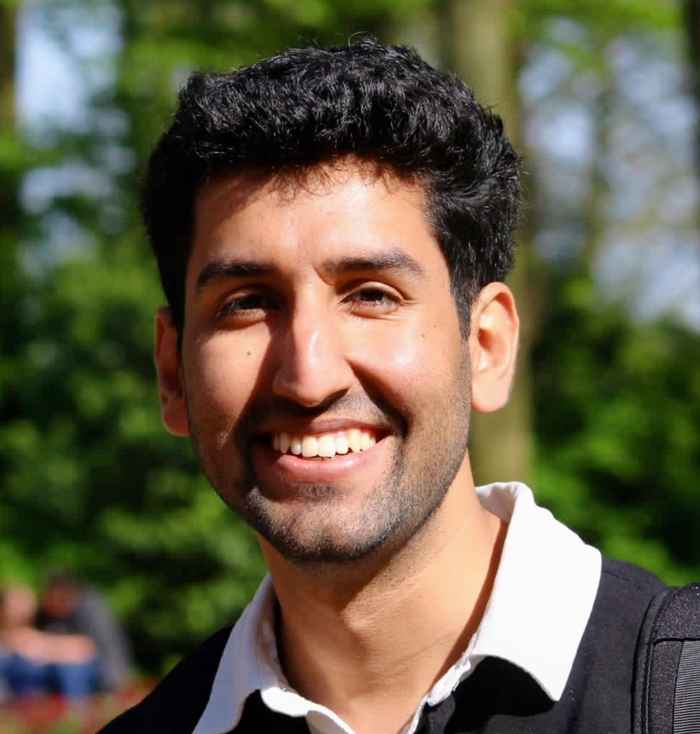Postdoc uses AI to analyse feelings in online data
24 September 2024

He analyses organic online data, such as pictures, tweets and reviews. The aim is to gain a comprehensive understanding of abstract, perceptual attributes, such as feelings, that are relevant to businesses. Sharma utilises this approach to understand how corporate companies implement greenwashing. He is also involved in the development of ‘Exquisitor’ – an interactive image search engine.
Sharma studied Electronics and Communication Engineering at VIT University in India and Artificial Intelligence at the UvA. He started his PhD in Business Analytics at the ABS in 2018. For his research he analyses data and applies AI to solve business problems.
Adding subjective properties to objective data
The research conducted by Sharma and his colleagues strives to bring new perspectives to marketing. ‘Traditional marketing research generally uses well-structured data, coming from survey-driven studies,’ he describes. ‘We, however, want to find out what we can learn from organic data that already exists.’ By that, he means pictures, tweets, posts and reviews you can find online. The owners and writers of this data express themselves more freely than respondents in a survey, says Sharma. ‘They are not part of a structured study and are not getting paid for doing this. Therefore, they are more open towards expressing opinions on a range of subjective attributes.’ According to Sharma, the consequence of this data being more unstructured, is that it offers a larger range of diverse and natural opinions.
The researcher uses the data to understand abstract qualities alongside more tangible objectives. ‘Picking up these attributes is crucial for marketeers, because they fundamentally shape consumer perception. Perception is subjective – how I feel about an image may not be how you feel about it.’ Sharma illustrates this concept with a picture of a dog. ‘I may just have gotten a dog and somebody else might just have lost theirs. The emotions associated with an image can be widely varied.’ In his research he tries to distinguish these types of properties in images, texts and other types of media, to get a more holistic insight.
Understanding greenwashing
One of Sharma’s projects focuses on detecting greenwashing in the marketing of corporations. ‘These companies portray themselves as being greener, more environmentally conscious, than they are.’ This project is funded by the Research Centre for Sustainable Investments and Insurance (RCSII), established by the insurance company ASR Nederland and UvA Economics and Business.
The postdoc and his colleagues analyse the social media posting history of companies to learn how they greenwash. ‘We try to see it from the abstract, subjective lens, because greenwashing is often done subtly, in a hidden way. If everything appears green, consumers get the feeling nothing is really green.’ They also investigate this through the lens of the ESG (environmental, social and governance) risk ratings. ‘We try to find the gap between what companies say and what they actually do.’ The goal is to better inform consumers. ‘We want to reward good companies as well, because in all of this greenwashing they tend to get overlooked’, says Sharma.
Search engine can help Alzheimer's patients
The ABS researcher is also involved with Exquisitor, a video and image search engine. It was developed in collaboration with researchers from Reykjavik University in Iceland. The system was ranked as third best in the ACM Lifelog Search Challenge 2024, held at this year’s International Conference on Multimedia Retrieval (ICMR) in Phuket, Thailand. Exquisitor enables queries in ‘lifelog’ data. This includes personal data such as images, video, audio and location details. ‘Lifeloggers’ continuously save this data over many years. ‘The concept behind Exquisitor is that you can search through massive collections of pictures using conversational search, as well as via relevance feedback. That means navigating by indicating positive (relevant) and negative (irrelevant) examples.’
‘With Exquisitor you can search even when queries are vague, incorrect or lack information,’ Sharma explains. ‘If you're trying to find a picture of a sunset with just a few clouds in the sky rather than a fully clouded one, it might be difficult to describe this precisely in words.’ The user can respond with ‘yes’ or ‘no’ to the results, allowing the relevance feedback system to narrow them down as quickly as possible. Exquisitor can for instance help Alzheimer’s patients who are looking for something in their private collections. ‘The information they have available may not be precise enough for regular search engines.’ Because they can interact with the tool, these people are more likely to find the picture and memory they have lost.
A truly interdisciplinary field
Business analytics can make a difference, the reseacher says. ‘We study issues deeply rooted in society.’ He points out that ‘human-centered AI problems’ cannot be solved without interdisciplinary expertise. ‘It’s not enough to approach these issues on a machine, in an isolated way. Students and researchers with a background in business or disciplines such as psychology and philosophy can offer different perspectives and important expertise. The field is truly interdisciplinary.’